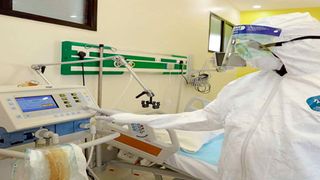
A health officer at Coast General Hospital in Mombasa County checks ICU machines in the Covid-19 ward on July 27, 2020.
| Laban Walloga | Nation Media GroupNews
Premium
Experts urge caution as Covid-19 deaths, ICU admissions surge
What you need to know:
- This is a sign that more are getting severely infected and that hospitals could be overwhelmed in the coming weeks.
The Covid-19 situation seems to be worsening, going by the number of deaths being recorded and the sharp increase in the number of hospital admissions.
As of Thursday, the country had lost 57 people in just five days, in a worrying trend that indicates either the Health ministry has not been recording all the deaths, or more people could be dying at home from Covid-19-related complications.
On Tuesday, the country lost 17 patients, while from Monday to Sunday 29 more patients died from the virus.
The number of patients being admitted to the intensive care units (ICUs) has also been increasing over the past one week.
Data from the Ministry of Health for the past four days reveals 535 patients were admitted to various ICUs across the country, with more than 140 patients admitted on Tuesday.
This is a sign that more are getting severely infected and that hospitals could be overwhelmed in the coming weeks.
This is happening at a time when Covid-19 cases in Nairobi are increasing, with more than 350 infections being recorded in the county on a single day.
In a span of six days – from Friday last week to Wednesday – the city county recorded 1,340 cases.
All beds occupied
A spot check revealed all the ICU beds at public referral hospitals were occupied, including at Kenyatta National Hospital, Mbagathi Hospital, Kenyatta University Teaching, Referral and Research Hospital as well as Jaramogi Oginga Odinga Teaching and Referral Hospital.
In Mombasa, the ICU beds at Coast General Teaching and Referral Hospital and private hospitals were reportedly fully occupied.
A source at a hospital in Nairobi told the Nation that the ministry should go back to constantly warning Kenyans against lowering their guard.
“People need to be told that things are getting worse because if no one is talking about it, then Kenyans think it is normal,'' said a nurse at KU hospital.
The nurse who sought anonymity told the Nation that the facility was full and that the management was considering opening a new wing for Covid-19 patients.
“The deaths are also increasing on a daily basis. People are seeking care when it is very late and this reduces their chances of survival since the disease interferes with the breathing system,” she added.
Vaccination necessary
Dr Willis Akhwale, who chairs the Covid-19 vaccine deployment task force, said Kenyans should know the virus is still around and that they are not safe until they are vaccinated.
“Most people get severely ill because they are not vaccinated and the only way to stay safe is to adhere to the heath measures,” he said.
Only two per cent of Kenya’s population is fully vaccinated, with only 595,124 having received their second dose and 1.4 million the first dose.
“I am optimistic that everybody who received the first dose of AstraZeneca will receive the second one. It is just a matter of time but before that we are very unsafe. Please take care of yourself and your loved ones,” he warned.
Dr Ahmed Kalebi, a consultant pathologist, said the government could be underreporting the Covid-19 numbers.
“The issue is mainly under-reporting of tests done and inadequate testing from a public health perspective. There is also incomplete collection and collation of Covid-19 test results by the Ministry of Health from across the country as done by public and private medical facilities, whereby the results of Covid-19 tests done in these medical facilities are not submitted to the Health ministry,” Dr Kalebi said.
Dying at home
An official at the Ministry of Health said very little was being done to trace those whose samples turn positive.
“It is as if the fourth wave has not picked up. People are crowding hospitals when they are seriously sick, with some dying at home. We are no longer testing enough to know the impact of this disease in our community,” the source said.
The testing situation, Dr Kalebi said, is driven by demand from travellers, clinical requests by doctors and the contacts of patients who can afford to take a test.
“There is very little testing, if any, at the community level for public health surveillance. If you compare the scale of testing in Kenya with that of, say, Rwanda and South Africa, you’ll see the per capita testing is way too low in Kenya. This means we don’t have a true representation of what is going on in the community,” he explained.
Dr Patrick Amoth warned with or without high admission numbers, Kenyans should be more cautious.
“Take care of yourself, that's all you need to know. If I was a Nairobi resident, I would be worried that the cases are rising on a daily basis,” Dr Amoth said.





